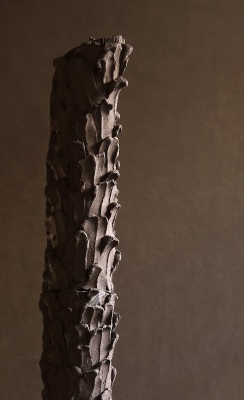Descripción de la Exposición
Portikus is pleased to announce Liberty, Laura Langer’s first institutional solo exhibition.
The exhibition presents a new series of works, which are site-specific to Portikus. Seven paintings refer to the architecture, its function and its organization. The result is a body that informs itself cyclically, using repeated images, corresponding phrases, and the imperative position to generate relations, and to reinterpret the spaces in which they are displayed. What kind of authority does the building have? How is it organized? Can it be reorganized?
CL (Christina Lehnert): So it is a question of the individual and society? Inside and outside?
LL (Laura Langer): Or that the voices from the outside actually become yours. It gets hard to differentiate. That’s the work one has to do all the time, I believe, just to understand how to go on. Figure out: What is from my parents, what is from society, what is from my friends… you know? What do I want to keep from my family or my culture, to incorporate into myself, and what do I want to throw away? It is this cleaning up of voices that one is doing all the time. And when you don’t do it, you find yourself confused.
CL: And the messy room becomes a metaphor for the many voices?
LL: Could be. Or it could very simply be a metaphor for the inner trouble. What I struggle with when I see the messy room is: You know that it’s easy to start to clean up, but this precise moment of starting is the most difficult thing to do. It is a moment of paralysis between thought and movement—not even being able to start doing an action that is so simple to do. At that moment of paralysis, you almost give up and say, “The mess is ok.” But then actually, it’s not ok, the mess, you know? You may try to be ok with it, but actually you have to start, and do it, clean it up. I think that the Und Ihr? (And you?) that appears on the paintings is a little bit this wake-up call like: “What are you doing with yourself that your room looks like that?” Und Ihr? is this kind of voice—that might be able to make your action start. As if the guilt this question brings up will force you to finally do something.
PT (Person Three): This is ironic because nobody does anything through guilt.
CL: No. I think it’s not true. I think there are a lot of things you may do from guilt… Some religions are based on the feeling of guilt.
LL: I think religion has similar mechanisms as the state: it conditions and controls what we think through guilt. This is how they access our brains and how they construct subjects.
PT: You may react to something, you may perform, but you may not do things out of guilt. What makes you fully do something is desire. If you are not convinced of what you do, if you do not desire it, you will make mistakes or you will hurt yourself. Now thinking about the problem that Laura talks about—action and the messy room—of course they are obstacles. We tend to bind pleasure with desire and that is not always true. Pleasure and desire can be divergent. To conquer desire, we sometimes need to go through displeasures and efforts, but at the end, when a desire is fulfilled, pleasure is reached on a higher level. Clearly if there is no basis of desire, we wouldn’t give a shit about anything, and we would instead be beings of pure duty. A happy world is not a duty-filled—that is to say scientifically regulated—world… it would be a very terrible world, a very dark uchronia. The order of the desire is the only one that really counts: to subordinate everything to the desire. The indeclinable quality of desire is the only authority and orientation that is not mistaken.
Laura Langer, *1986 in Buenos Aires, lives and works in Berlin.
In 2017, she graduated from Hochschule für Bildende Künste – Städelschule. Her works have been shown at Piper Keys, London (2018) and Weiss Falk, Basel (2017.)
Director: Philippe Pirotte
Curator: Christina Lehnert

Exposición. 17 abr de 2025 - 03 sep de 2025 / Centro Cultural Andratx (CCA) / Andratx, Baleares, España

Formación. 08 may de 2025 - 17 may de 2025 / Museo Nacional Centro de Arte Reina Sofía (MNCARS) / Madrid, España